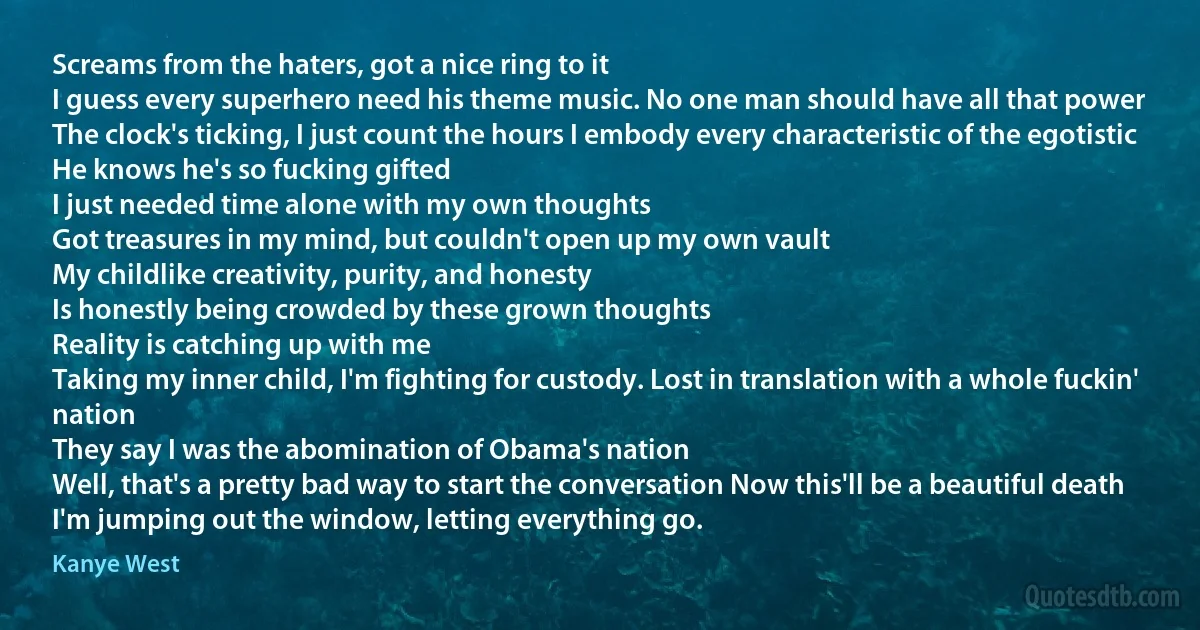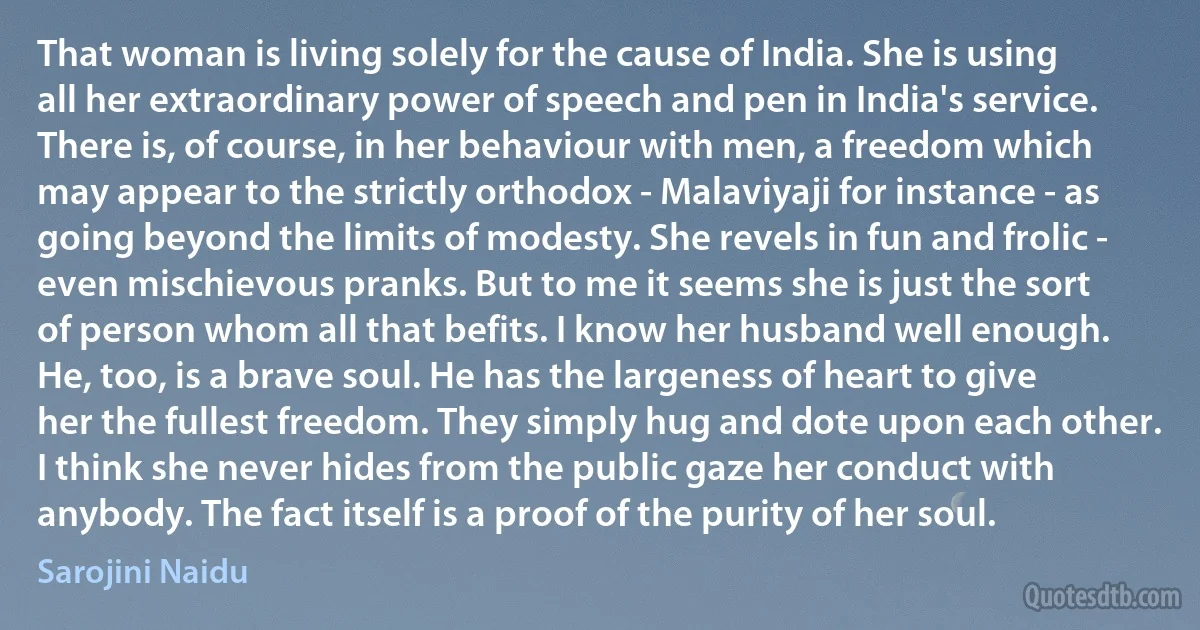Purity Quotes - page 15
To say it once again: today I find it an impossible book - badly written, clumsy and embarrassing, its images frenzied and confused, sentimental, in some places saccharine-sweet to the point of effeminacy, uneven in pace, lacking in any desire for logical purity, so sure of its convictions that it is above any need for proof, and even suspicious of the propriety of proof, a book for initiates, 'music' for those who have been baptized in the name of music and who are related from the first by their common and rare experiences of art, a shibboleth for first cousins in artibus [in the arts] an arrogant and fanatical book that wished from the start to exclude the profanum vulgus [the profane mass] of the 'educated' even more than the 'people'; but a book which, as its impact has shown and continues to show, has a strange knack of seeking out its fellow-revellers and enticing them on to new secret paths and dancing-places.

Friedrich Nietzsche
Everything we do, our every objective, must be undertaken for the sake of... purity of heart... we must practice the reading of the Scripture, together with all the other virtuous activities... to hold our hearts free of the harm of every dangerous passion and in order to rise step by step to the high point of love.

John Cassian
He who through virtue and spiritual knowledge has brought his body into harmony with his soul has become a harp, a flute and a temple of God. He has become a harp by preserving the harmony of the virtues; a flute by receiving the inspiration of the Spirit through divine contemplation; and a temple by becoming a dwelling place of the Logos through the purity of his intellect.

Maximus the Confessor
Mary properly bore the name of Virgin, and possessed to the full all the attributes of purity. She was a virgin in both body and soul, and kept all the powers of her soul and her bodily senses far above any defilement. This she did authoritatively, steadfastly, decisively and altogether inviolably at all times, as a closed gate preserves the treasure within, and a sealed book keeps hidden from sight what is written inside. The Scriptures say of her, 'This is the sealed book' (cf. Rev. 5:1-6:1; Dan. 12:4) and 'this gate shall be shut, and no man shall enter by it' (Ezek. 44:2).

Gregory Palamas
A holy man will follow after purity of heart. He will dread all filthiness and uncleanness of spirit, and seek to avoid all things that might draw him into it. He knows his own heart is like tinder, and will diligently keep clear of the sparks of temptation. Who shall dare to talk of strength when David can fall? There is many a hint to be gleaned from the ceremonial law. Under it the man who only touched a bone, or a dead body, or a grave, or a diseased person, became at once unclean in the sight of God. And these things were emblems and figures. Few Christians are ever too watchful and too particular about this point.

J. C. Ryle
Oh! what a frightful business is this modern society; the race for wealth - wealth. I am ashamed to write the word. Wealth means well-being, weal, the opposite of woe. And is that money? or can money buy it? We boast much of the purity of our faith, of the sins of idolatry among the Romanists, and we send missionaries to the poor unenlightened heathens, to bring them out of their darkness into our light, our glorious light; but oh! if you may measure the fearfulness of an idol by the blood which stains its sacrifice, by the multitude of its victims, where in all the world, in the fetish of the poor negro, in the hideous car of Indian Juggernaut, can you find a monster whose worship is polluted by such enormity as this English one of money!

James Anthony Froude
The RKM professes a syncretism, combining elements from different religions. Ramakrishnaism is the syncretism par excellence, affirming "all” religions to be true. As the Church Fathers wrote, syncretism is typical of Paganism. The Roman-Hellenistic milieu in which the first Christians had to function, was full of syncreticism, with Roman matrons worshipping Isis with the babe Horus (an inspiration for the image of Mary holding the babe Jesus), legion soldiers worshipping Persian-originated Mithras, and imperial politicians worshipping the Syrian-originated Sol Invictus... Against this syncretism, they preached religious purity: extra ecclesiam nulla salus, outside the Church no salvation. They had no problem admitting that Paganism was naturally pluralistic, but what is the use of choosing between or combining different kinds of falsehood?

Koenraad Elst
When at the beginning of the so-called modern age, at the Renaissance, the pagan sense of religion came to life again, it took the concrete form in the knightly ideal with its codes of conduct of love and honor. But it was a paganism Christianized, baptized. "Woman - la donna - was the divinity enshrined within those savage breasts. Whosoever will investigate the memorials of primitive times will find this ideal of woman in its full force and purity; the Universe is woman.

Miguel de Unamuno
[The world's] not a great place anymore and it can't be. I'm sure it would have been much more enjoyable to be alive in the fifties, when there was at least an illusion of purity, and things that were taboo had such a great power to them. I think it was a time when magic was really alive. There's no imagination anymore. It was eliminated with video games and VCR's. I'm only necessary because of the way the world is. Well, maybe if I manage to make the world a better place then maybe I'd want to have a kid.

Marilyn Manson
There were a lot of utopias in the nineteenth century, wonderful societies that we might possibly construct. Those went pretty much out of fashion after World War I. And almost immediately one of the utopias that people were trying to construct, namely the Soviet Union, threw out a writer called Zamyatin who wrote a seminal book called We, which contains the seeds of Orwell and Huxley. Writers started doing dystopias after we saw the effects of trying to build utopias that required, unfortunately, the elimination of a lot of people before you could get to the perfect point, which never arrived. ... I don't believe in a perfect world. I don't believe it's achievable, and I believe the people who try to achieve it usually end up turning it into something like Cambodia or something very similar because purity tests set in. Are you ideologically pure enough to be allowed to live? Well, it turns out that very few people are, so you end up with a big powerful struggle and a mass killing scene.

Margaret Atwood
When we have torn off the coatings of this life's perishable leaves, we must stand again in the sight of our Creator; and repelling all the illusion of taste and sight, take for our guide God's commandment only, instead of the venom-spitting serpent. That commandment was, to touch nothing but what was Good, and to leave what was evil untasted; because impatience to remain any longer in ignorance of evil would be but the beginning of the long train of actual evil. For this reason it was forbidden to our first parents to grasp the knowledge of the opposite to the good, as well as that of the good itself; they were to keep themselves from "the knowledge of good and evil,” and to enjoy the Good in its purity, unmixed with one particle of evil.

Gregory of Nyssa
The Albanian culture is elusive to me. I think this has to do with leaving the country at such an early age, as well as the country rediscovering her roots after many decades of repression. What I can say about the Albanian culture is what runs through my limbs and what carries my philosophy in life. There's a condensed softness about the Albanian people, and I've witnessed examples of their hospitality that have been famously engraved in history for centuries. Maybe I'm soaking memories of my homeland in sentimental syrup that grows thicker and sweeter with time, but there is something truly noble about the Albanian people and their culture of purity and keeping promises.

Sali Berisha
Christians rejoice in secret beauty and bounty, hidden from the world, but known to God. Self-forgetfulness, purity, and affection are constant prayers. Practice not profession, understanding not belief, gain the ear and right hand of omnipotence and they assuredly call down infinite blessings.

Mary Baker Eddy
Shirk not these crises, hard and difficult though they may appear to be. Difficult they are. Forget not that the habit of confronting crises, is a long-established one within the consciousness of humanity. Man has the "habit of crisis", if I may so call it. They are only the points of examination as to the strength, purpose, purity and motive and the intent of the soul. They evoke confidence when surmounted, and produce greatly expanded vision. They foster compassion and understanding, for the pain and inner conflict they have engendered is never forgotten, for they draw upon the resources of the heart. They release the light of wisdom within the field of knowledge, and the world is thereby enriched.

Alice Bailey
Have you looked at a modern airplane? Have you followed from year to year the evolution of its lines? Have you ever thought, not only about the airplane but about whatever man builds, that all of man's industrial efforts, all his computations and calculations, all the nights spent over working draughts and blueprints, invariably culminate in the production of a thing whose sole and guiding principle is the ultimate principle of simplicity?
It is as if there were a natural law which ordained that to achieve this end, to refine the curve of a piece of furniture, or a ship's keel, or the fuselage of an airplane, until gradually it partakes of the elementary purity of the curve of a human breast or shoulder, there must be the experimentation of several generations of craftsmen. In anything at all, perfection is finally attained not when there is no longer anything to add, but when there is no longer anything to take away, when a body has been stripped down to its nakedness.

Antoine de Saint Exupéry
Purity of heart will not make us poor. The exaltation of poverty as a spiritual virtue is of the ego, not the spirit. A person acting from a motivation of contribution and service rises to such a level of moral authority, that worldly success is a natural result.
Give all your gifts away in service to the world. If you want to paint, don't wait for a grant. Paint a wall in your town that looks drab and uninviting. You never know who's going to see that wall. Whatever it is you want to do, give it away in service to your community.

Marianne Williamson
In the years between our defeat in 1979 and our defeat in 1983 Labour was increasingly seen to be a party slipping towards impossiblism, succumbing to fads, riven by vicious divisions, speaking the language of sloganised dogma – and usually voicing it in the accents of menace. It was almost as if sections of the party measured the purity of their socialism by the distance which they could put between it and the minds of the British people.

Neil Kinnock



